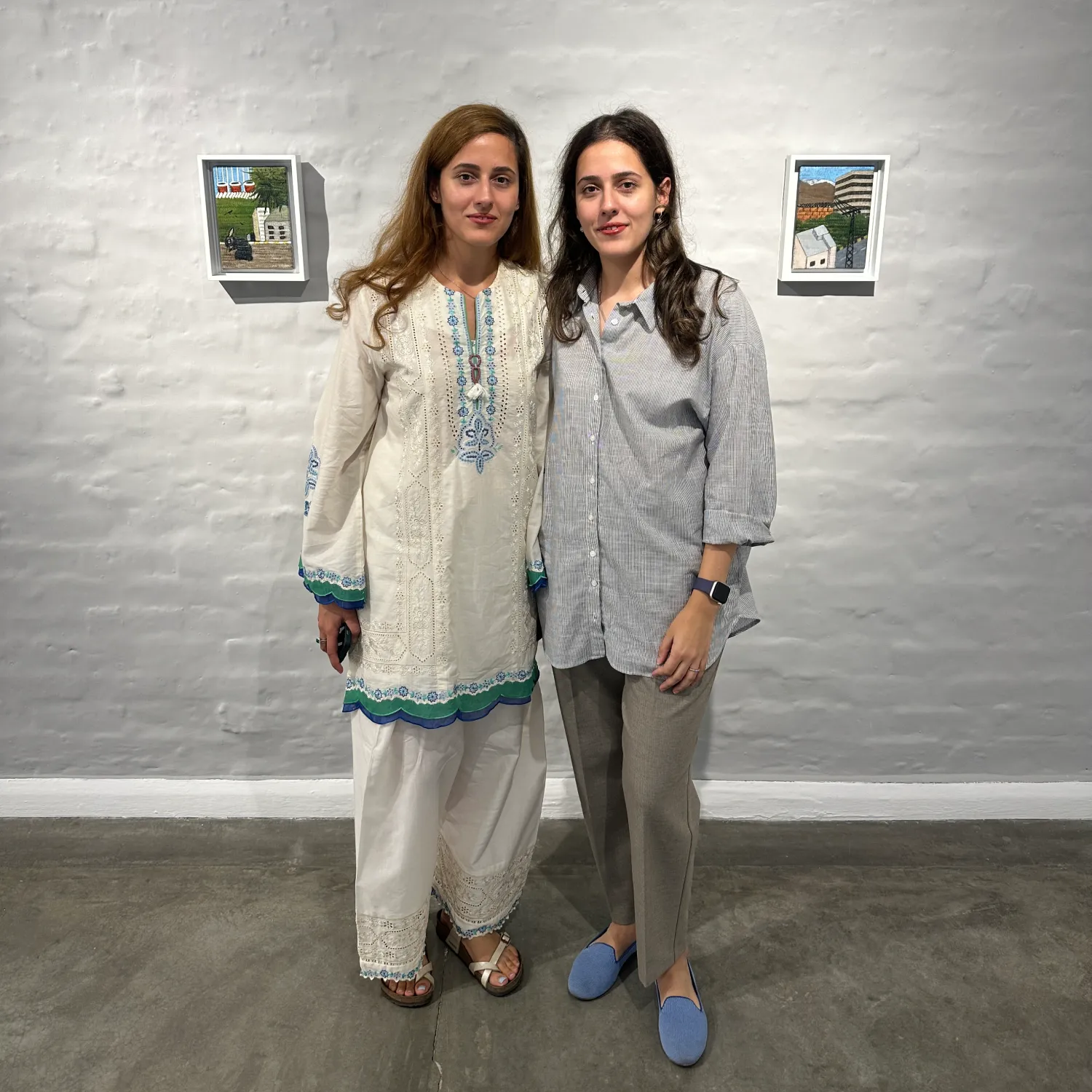Driving down the lanes of DHA on a Friday afternoon, I could feel my heart thumping a little faster than usual. The anticipation of meeting Rina Mohsin of the eponymous Rina’s Kitchenette felt akin to meeting a celebrity to me, someone whose reputation preceded her, but who had rarely been seen out in the public arena. Just a few days before our interview, she had received an award for Business and Social Entrepreneurship by the Government of Punjab for her contributions to the culinary industry. Countless birthdays, anniversaries, and special occasions while growing up in Lahore were celebrated over a Toblerone cake from Rina’s Kitchenette, always a crowd pleaser with its delightful chunks of chocolate ensconced in soft, moist layers of cake.
The 2010s saw a rise in terms like ‘girlboss’ and ‘momagers’ - women were more visible in leadership positions and were referenced using these terms, not always in a good way. The idea that a woman could have it all - business success, a happy family, beauty, money and power - seemed more and more possible with figures such as Emily Weiss and Kris Jenner making splashy headlines in the press. Thinking of this on my way over to meet Rina Mohsin for the first time, I was curious to see what her experience had been like as one of Pakistan’s most prominent female entrepreneurs, someone who had to juggle her responsibilities as a mother with three young children and domestic duties along with her career. Baking and cooking is by no means an easy job; it is practically a science. Everything must be precisely measured and timed, or the outcome is not quite right.

Friday prayers had just concluded as my car navigated the throng of worshippers heading back to their homes, the mosque just a few streets away from Mrs. Mohsin’s residence were she had generously invited me to come visit for our interview. Notoriously camera shy and averse to making public appearances, it was an honor to be able to see her in her natural habitat: the home she had lovingly built after years of struggling financially in her early life. She greeted me at the door, and I was struck by the softness in her brown eyes and the gentle, maternal manner in which she ushered me in. “When I was very young, we lived in Tanzania Dar-us-Salam, and my mother used to cook a lot and bake for bake sales. From a very early age I used to help her and loved setting the table and decorating the trolleys. I remember watching her make cakes, cupcakes and cookies.”
Starting a business as a young mother of three children, Mrs. Mohsin was not without misgivings. “I was teaching at Kids Kampus when I started my baking business. My youngest had his entrance test at Aitchison College in 2001 and I was sitting with all the mothers, waiting for the kids to come out. A friend commented that since I make such nice desserts, cakes and knick knacks, I should start making them for sale. I was hesitant; I already had a job, my kids were very young, and I had to look after the house as well.”
“It has always been my children, my husband and my house first as my priorities. I am a very finicky person, and it isn’t always a good thing,” she lamented to me, but when running her business perhaps it is this attention to detail and self-imposed high standard that are key to the success of her thriving business. Mrs. Mohsin’s drawing room is a beautifully decorated space, spotless and well-furnished with eclectic art adorning the walls. The room feels warm and inviting, not ostentatious in any way, much like Mrs. Mohsin herself. Throughout the course of our several hour long conversation, I was fascinated by how down to earth and authentic she was, despite all her success and the fact that she is practically a household name in Lahore. A far cry from the glossy and commanding image of ‘girl bosses’ and ‘momagers’, Rina Mohsin is soft-spoken and humble, and the first to admit the trials and tribulations she faced over her decades-long career.
The family was faced with a series of financial setbacks in the early days: first, her husband’s family business declined, next the travel agency he had established faltered when 9/11 happened. Rina was not one to sit idly and watch as her husband struggled to keep the family afloat, and tried many different ventures, from making clothes by sourcing handmade fabric from interior Sindh, to trying her hand at selling furniture. “I had to step up to the plate because I wanted to give my children a good future. I stopped socializing and focused only on my work.” Her insight into that period of time in her life reminded me of the conversation between Oprah Winfrey and Michelle Obama, both women acknowledging that women can “have it all, just not at the same time.” There is an element of sacrifice that is intertwined with entrepreneurship, especially when it is a woman at the helm in a male-dominated context such as Pakistan.
In the early 2000s, the food scene in Lahore was decidedly bland, and except for a handful of well-known restaurants, no fancy cafes, bakeries, or restaurants really existed. The boom of home-based businesses bolstered by the rise of social media marketing was not yet a thing. It was in this environment that Rina Mohsin set out to establish her bakery empire, equipped only with her home kitchen and a landline phone, though at the time she couldn’t foresee how her baked goods would build an empire. What started as a small business that relied on word of mouth and operated via her home landline in the early aughts, eventually grew to a small ‘pick up point’ in X block DHA, and from there expanded to a restaurant with the same name Rina’s Kitchenette in Defence, followed by another branch opening in Gulberg and an expansion to the DHA branch. Today, the Mohsin family boasts a wide ranging portfolio of restaurants, with several branches of the original iteration Rina’s Kitchenette, as well as Dan Dan, an upscale pan-Asian restaurant, and XO Chinese Chips, a takeaway restaurant that does an experimental take on french fries with Asian-inspired flavors.
Business was slow to start, and initially it was one, two, or three cakes a week only. Cousins who worked at banks and MNCs offered to take Rina’s cakes to their workplaces to spread the word. Mrs. Mohsin’s eyes sparkled and a smile lit up her face as she recalled the early days, “I had a hand beater and worked from my home kitchen. For so many years, I operated with just one helper from home, without any commercial equipment, no branding, no packaging. We could not afford anything more. My babies were going to school, and we lived in a rented house. Covering all the expenses was a struggle and it was a tough time for a long while.” Perseverance, then, was key to the success of Rina’s Kitchenette.
As business flourished, Mrs. Mohsin soon found herself providing three or four hundred cakes to various banks over the festive Eid season, baking late into the night with her kids and husband from their home kitchen. As luck would have it, in 2007, an irate neighbor, fed up with the horde of cars arriving to collect orders at all hours, placed a complaint with the DHA authorities, as businesses are forbidden to operate in residential areas. This event turned out to be a blessing in disguise, the catalyst that forced the Mohsin family to find a commercial outlet, and provided the very first push that Rina’s Kitchenette received on its path to becoming more than just a home-based food business. “I thank Allah for all of it, even the tough times,” she says to me, noting that the complaint was the “best thing” to have happened to her business.
To be successful in the food industry is by no means an easy feat, and differentiating oneself from the competition is key to carving out a unique brand identity. Just as Christina Tosi of MilkBar created unconventional flavors like cereal cake and compost cookies, Rina Mohsin used her creativity and flair to her advantage, inventing enduring favorites such as Caramel Crunch, Dairy Milk and Toblerone cakes infused with delicious chunks of chocolate and caramel, a novel concept in the food scene at the time. Other than crafting interesting flavor profiles, it was also important for the entrepreneur to build a strong foundation for her business. In that regard, she acknowledges the tremendous support from her husband, children and parents, all of whom helped fulfill the extraordinary amount of orders that were piling in. The Rina’s empire is also lucky to still have the staff initially hired when starting out, a testament to the positive working environment fostered by the Mohsin clan. “They are like family to us, and they see that we really know our work and we work alongside them in the kitchens,” commented Mrs. Mohsin. Batool, the vivacious chef behind the restaurants and Rina Mohsin’s daughter, adds that when the first restaurant opened, she would be in the kitchen from 8 am till 2 am every day with the line cooks.

The Mohsin children each studied in fields that served the business. Batool went to culinary school in the South of France for a French patisserie course, refining her pastry skills. Later on, when the first restaurant was set up in 2016, she went to Italy to learn pizza-making and played a pivotal role in establishing the restaurant menu and running the kitchen. Ammar Mohsin took the corporate route, working for Unilever and learning the business side of things, accumulating six years of experience before asking to join what was now officially a family business. The youngest son Mustapha, a gifted artist, decorated the cakes in the early days, and has painted the oil portraits that decorate the restaurant walls now. The rest, as they say, is history, with the family growing the business into a large portfolio of restaurants. Even now that there are multiple restaurant locations, Mrs. Mohsin dreams of someday soon setting up a fine dining restaurant.
The journey was punctuated with numerous moments of self-doubt, uncertainty, and at times even failure. “I would tell my kids that I’ve invested every last penny of our savings into this business and if it fails, we will be forced out onto the street. I knew my cakes would sell, but I had no idea how the restaurant would do. I still remember the day it opened; there was a line out the door.” Later on in 2020, the family decided to launch Dan Dan, a pan-Asian restaurant, and invested in setting up a restaurant location and developing a menu. But then Covid and the lockdowns hit, tanking the entire investment. It took two years to recoup the lost investment, and finally Dan Dan was launched in 2022. The reception was amazing; foodies flocked to the hotpot-centric restaurant because it was innovative and boasted luxurious interiors, perfect for both Instagram posts and family gatherings.

The story of Rina Mohsin is one of sacrifice and commitment. She is not loud, pushy, or commanding as you may expect from a successful businesswoman, but her authenticity and passion shine through, and you can taste the love in everything that has her name on it. It’s this love that is a key to her success, a love she has painstakingly nurtured in her business, in her family, and in her relationships with her employees and customers. Today, the Rina’s Kitchenette empire provides catering for events, bespoke desserts that Mrs. Mohsin still creates herself for customers, in addition to the multiple restaurant locations. Batool points out the pressures that come with Rina Mohsin’s name in the industry as the ‘cake wali aunty’ and the need to carry that name and its associated good faith in all their future ventures. But Rina Mohsin proudly tells me she has “blind faith” in her kids now, a reminder of the blind faith that was placed in her 24 years ago by her husband and children to make a name for herself and support the family. Things have come full circle for the Mohsin clan, and Rina Mohsin’s story is a testament to what can be achieved if one has conviction and the commitment to see the dream to its fruition.






